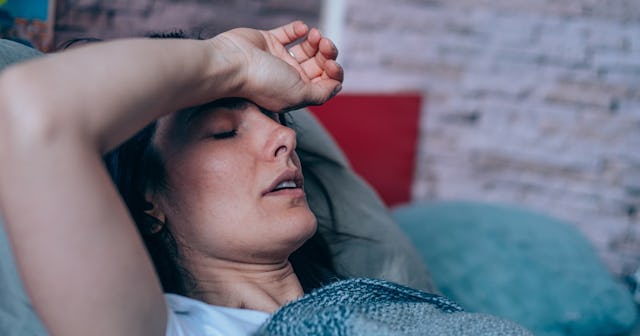Postpartum Night Sweats Are A Thing, Here's How To Deal With Them

As if being a new mom wasn’t exhausting enough, all sorts of strange things start happening to your body postpartum, not the least of which are the dreaded postpartum night sweats. Of course, the body sweats for all sorts of reasons, including anxiety, hyperthyroidism, menopause, or sleep apnea, among many other reasons. But night sweats are a particular sort of sweating — it’s not just that you’re bundled in too many blankets, or the heat is up too high. The Mayo Clinic describes them as repeated incidents of excessive sweating, and they don’t always mean that there is an underlying condition to give you cause for concern. It’s your body’s way of flushing itself of all the excess fluids that helped you through your pregnancy and your new baby’s development. All it means is that your body is doing what it needs to do to keep you healthy postpartum.
Even if waking up in the middle of the night drenched in your sweat — if you weren’t already awake for feedings and diaper changes, of course — isn’t a cause for immediate worry, it’s still uncomfortable. It would be best if you mentioned it to your doctor so that they know what’s going on with you as you acclimate to motherhood.
Is it normal to have postpartum night sweats?
Postpartum sweating (or their counterpart, hot flashes) is normal. Per Parents, it’s just the hormonal changes that make you toss and turn throughout the night. Dr. Dara Matseone-Peterssen, chief of general obstetrics and gynecology at New York-Presbyterian Allen Hospital, tells the outlet, “During pregnancy, levels of estrogen and progesterone rise. After birth, these levels fall. Low estrogen levels mimic what happens in menopause, and some patients experience mood swings, vaginal dryness, along with night sweats.”
If you’re breastfeeding, you’re also going to have lower estrogen levels, making you more likely to experience pesky postpartum night sweating. Isn’t motherhood a joy?
How long do postpartum night sweats last?
Per Healthline, postpartum night sweats generally occur in the immediate days and first few weeks after giving birth, whether you’ve had a vaginal birth or a caesarian section. No one can deny that they are uncomfortable and make sleeping more complicated than it has to be, only adding to your exhaustion, but they are temporary. Much like everything else about parenting, these night sweats shall pass.
That said, every person’s body is different, so if you find that the postpartum night sweats or hot flashes are still happening weeks or even months after giving birth, you should talk to your obstetrician. Night sweats can sometimes signal other underlying conditions or childbirth complications.
What to Do About Postpartum Sweating
Luckily, there are things you can do to help your body through these less-than-ideal sleeping conditions. These tips are relatively simple, so you can take care of yourself while caring for your newborn in those early days.
— Drink more water. For one, all of that sweating is going to leave you dehydrated, so be sure to keep drinking water throughout the day to stay hydrated. It also helps to drink less coffee in the afternoon and evening. Cutting back on spicy food can cool your body down too.
— Grab a cold drink. Before falling asleep, make sure the inside of your body is cool by drinking ice-cold water before bed.
— Wear loose, cool clothing. There’s not a lot you can do to stop your hormones from doing their job, but you can mitigate the effects by wearing loose clothing to bed and even lining your pillow with a towel or extra layer you can change out throughout the night to make things more comfortable.
— Lay a towel down before you go to bed. This will keep your sheets from getting damp from your sweat. Put a rubber sheet under your bedding to protect the mattress too.
— Turn that thermostat down. Just turn on the AC or a fan if you have one at your disposal to help cool you down. Experts say the best bedroom temperature for sleep is about 65 degrees Fahrenheit.
— Consume less coffee, alcohol, and spicy foods. These items can make sweating worse. Avoid them when dealing with night sweats.
— Exercise. Another way to reduce the sweating is to exercise. Breaking a sweat during the day is not only good for your heart but can help lessen sweating at night.
— Grab a cold, wet cloth before bed. and drape it over your body before going to sleep. This will keep your body cool and reduce sweating.
— To avoid getting a rash, rub powder on your body. Be sure to target areas like behind your knees, neck, and between your thighs.
If you’re worried about your postpartum night sweats or hot flashes, you can take your temperature, but, likely, you don’t have a fever. If it’s over 104 degrees Fahrenheit, you can call your doctor for a check-up.
Don’t worry, Mama, night sweats are just one more burden of postpartum life, but they won’t last forever.
This article was originally published on